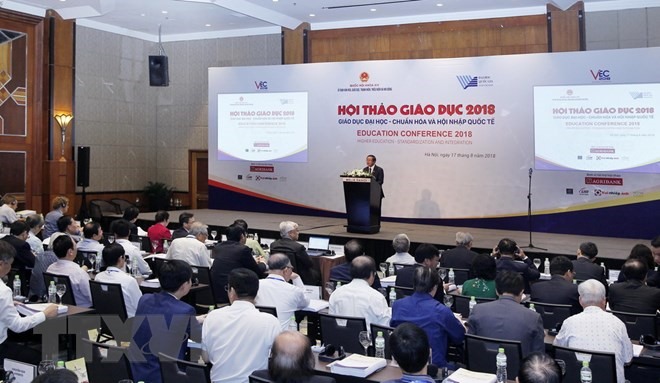 Society
Society

Universities need to foster innovation and take advantage of their autonomy to benefit the country and society, said Deputy National Assembly Chairman Đỗ Bá Tỵ.
 |
| Universities need to foster innovation and take advantage of their autonomy to benefit the country and society, said Deputy National Assembly Chairman Đỗ Bá Tỵ.— VNA/VNS Photo Lâm Khánh |
HÀ NỘI — Universities need to foster innovation and take advantage of their autonomy to benefit the country and society, said Deputy National Assembly Chairman Đỗ Bá Tỵ.
Tỵ made the statement yesterday at a conference themed “Higher Education – Standardisation and Integration” which attracted the participation of some 200 experts and educators.
On the occasion, he emphasied education and training as the country’s top priority. He also stressed the importance of higher education and improving the quality of labour productivity in the context of globalisation and integration.
Universities needed to be independent and responsible for developing training strategies to satisfy labour market demands, while making breakthroughs and building their reputations, he said.
According to Senior Economist Dilip Parajuli from the World Bank, Việt Nam ranked 84th out 137 countries and territories for its higher education system, with only Hà Nội National University and HCM City University being featured in the list of the top 1,000 universities worldwide and five institutions named in the top 400 Asian universities.
Parajuli said that Government policies limited universities from unleashing their full potential, so the Government should loosen its management over financial and administrative issues and create more room for them to self-develop.
The Government should only play the role of an orientor and let universities make decisions on their own, he said.
He added that universities would be responsible to their students and to the Government, and they should ask for more autonomy to improve quality and rankings for themselves and Việt Nam’s education in general.
As public investment for higher education in Việt Nam remains low, Parajuli recommended the Government to increase funding for key universities, especially the two national ones. Shared financial plans, student credit for example, should be developed to create more educational opportunities for all.
Academic freedom and internationalisation were essential to improving the autonomy of domestic universities, experts suggested.
Regarding the emerging trend of globalisation in education, the most significant changes include international student mobility, international expansion in the form of branch campuses, the rising number of international lecturers at domestic universities and international research collaborations.
Việt Nam, however, has showed little engagement in these changes which has put the country behind.
Independent from the State budget
According to a report by the Ministry of Finance (MoF), most public universities in Việt Nam depend on the State budget and tuition fees. Their income from services, research and technology transfers remains low.
The MoF said the Ministry of Training and Education should collaborate with universities to offer suitable tuition fee ranges, ensuring benefits for both universities and students. Students should also receive more financial support under the form of credits, scholarships or assistance.
The MoF also asked public and private universities to build and implement their financial plans, proactively seek revenue and control their spending, instead of waiting for funding from the State. — VNS




